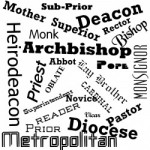Church Polity – Episcopal

This is the second post in my series on church polity. (See my post “Church Polity – Introduction.”) In this post, I am going to discuss the “episcopal” form of church government.
(Note: There are actually no pure forms of any of the three types of church government. Most churches use mixed forms. So, when I talk about “episcopal” forms of church government, I’m speaking about those churches in which the episcopal form is the primary form.)
Once again, we’ll start with Wikipedia’s definition:
Episcopal polity is a form of church governance which is hierarchical in structure with the chief authority over a local Christian church resting in a bishop (Greek: episcopos). This episcopal structure is found most often in the various churches of Roman Catholic, Eastern Orthodox and other Eastern Church, and Anglican lineage.
Here are a few entries from a Catholic reference site to help explain one form of the episcopal government:
Primacy: Papal primacy refers to the pope’s authority over the whole church.
Cardinal: Cardinals are appointed by the pope and constitute a kind of senate of the Church, and aid the pope as his chief counselors.
Bishops: The chief priest of a diocese. Bishops are responsible for the pastoral care of their dioceses. In addition, bishops have a responsibility to act in council with other bishops to guide the Church.
Presbyterial Council: Also known as the priests’ council, this is the principal consultative body mandated by the Code of Canon Law to advise the diocesan bishop in matters of pastoral governance. It consists of bishops and priests serving the diocese.
Pastor: A priest in charge of a parish or congregation. He is responsible for administering the sacraments, instructing the congregation in the doctrine of the Church, and other services to the people of the parish.
(Also see Article 6 of the Catechism of the Catholic Church.)
Similarly, the Church of England explains that the bishop of a diocese is the party responsible for the diocese:
The Canons of the Church of England state that the diocesan bishop is ‘the chief pastor of all that are within his diocese, as well laity as clergy, and their father in God’. Bishops have a particular responsibility for apostolic teaching and doctrinal orthodoxy and are to be themselves ‘an example of righteous and godly living’. They also have responsibility for worship, with the right ‘of conducting, ordering, controlling and authorising all services’.
The primary difference between the episcopal form of church government and the presbyterian form of church government is that final authority rests in one person in the episcopal form, while final authority rests in a group in the presbyterian form.
Those who espouse the episcopal form of church government usual point the necessity of having one person in charge. Similarly, they often point to the unity realized by having a single person in an authoritative position. From Scripture, they point to the hierarchy in the Old Testament levitical priesthood, as well as the role of the apostles in the New Testament. Specifically, they point to the Greek “episkopos” word group, from which we get the English term “bishop.”
The episcopal form of church government is also highlighted in Ignatius’ letters written sometime around 100 A.D.
Note that regardless of what the “governance” is called, if final authority rests in one person, then that church has an episcopal form of government in reality. This is true of many independent churches with a single strong leader (especially if that leader also started the church). A church with a senior pastor who holds final authority would also be an example of episcopal polity.
————————————————–
Church Polity Series
One Comment
Comments are closed. If you would like to discuss this post, send an email to alan [at] alanknox [dot] net.
Trackbacks/Pingbacks
- Church Polity – Congregational | The Assembling of the Church - [...] my series on church polity. (See my posts “Church Polity – Introduction,” “Church Polity – Episcopal,” and “Church Polity…
- Church Polity – Moving Forward | The Assembling of the Church - [...] is the seventh post my series on church polity. (See my posts “Introduction,” “Episcopal,” “Presbyterian,” and “Congregational” for introductions…

Well that answered my question. A baptist church with an episcopal government, who would have thought?